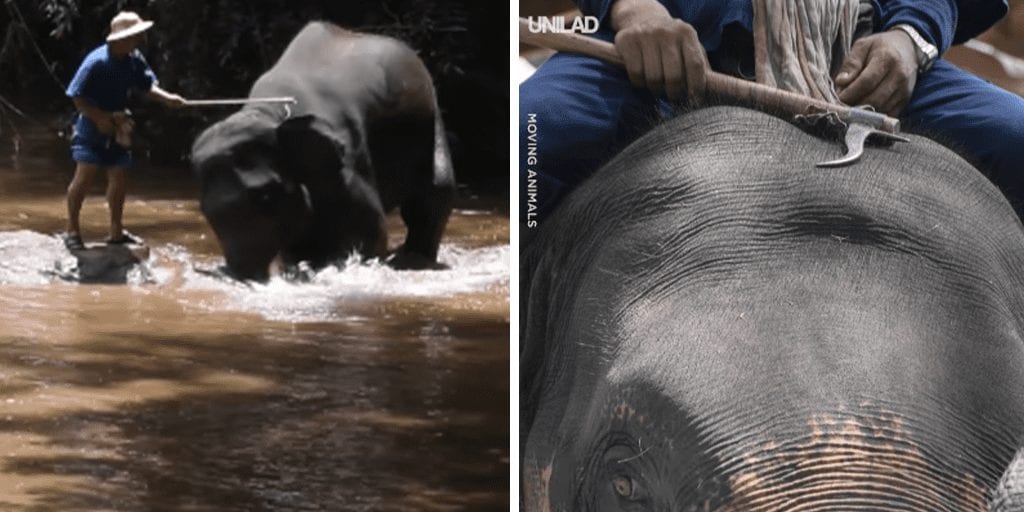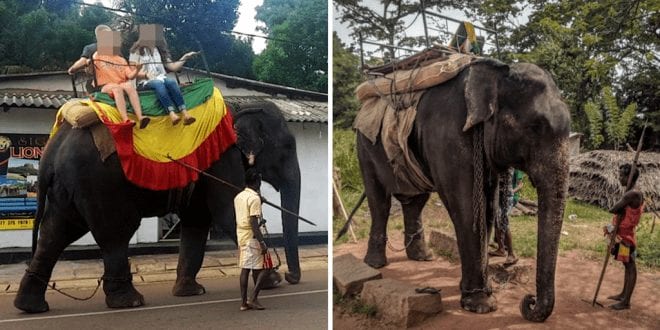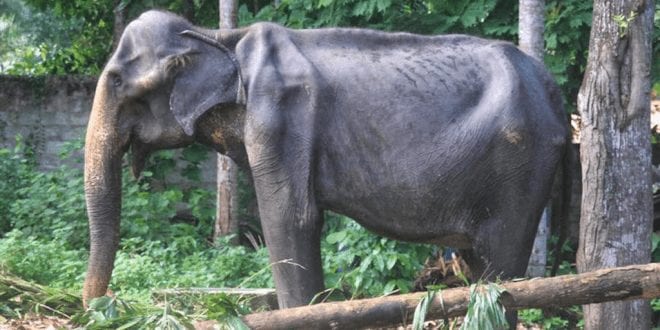
An investigation into the animal tourism industry in Thailand has revealed how baby elephants are ‘broken’ by online traders who sell them to companies posing as animal sanctuaries.
Young elephants are separated from their mothers soon after birth and forced to learn tricks by trainers who jab them with metal hooks.
Tourists must ensure they research any company claiming to be a sanctuary as reports of abuse are rapidly on the rise.
Lucrative
The lucrative industry starts with elusive online traders who lack the skills needed to raise the animals who belong in the wild with their mothers. Many are transferred to businesses after being starved to the point of extreme malnourishment.
An investigation featured in the Star followed a two-year-old elephant named Ploy who has already been taught to hold a ball in her trunk and throw it through a hoop in Ban Ta Klang village in eastern Thailand.
Investigators said this is where babies are ‘broken’ into submission by traders to prepare them for performances in front of crowds of tourists who take selfies and pay for rides.
The tamers say they have been training elephants for generations for safety reasons and claim that they do not use excessive force.
‘Stubborn’
“We do not raise them to hurt them… if they are not stubborn, we do nothing to them, ” one mahout told the publication.
But activists argue that elephants should be free to live their lives in the wild, and many condemn brutal methods to keep the animals in line. Babies are also removed from their mothers – who are extremely maternal – a the age of two, robbing them of key attachments
Payments
The industry has evolved and grown following the end of the use of elephants in the logging trade, which has been banned.
But the skills to tame elephants has been passed down through the generations, and mahouts today are drawn to the tourism trade which can fetch huge payments from wealthy tourists.
Celebrities have even been in the firing line of activists for visiting so-called sanctuaries – including Kim Kardashian.
Tamed elephants themselves can attract huge sums – those who can perform tricks can fetch £60,000, which is a massive amount when compared with average wage in Thailand.
Sanctuary?
The mahouts in Ban Ta Klang tame elephants who are showcased for cash at nearby parks which pose as sanctuaries.
Mae Taeng park in Chiang Mai charges $50 for an entrance fee and welcomes 5,000 tourists each day – who are keen to see young elephant Suda paint pictures which are then sold to wowed onlookers before she takes many for gruelling rides.
Tourists are increasingly prepared to boycott any businesses which have poor welfare standards, but many will see the word ‘sanctuary’ or ‘refuge’ and automatically believe the organisation is ethical.
Abuse
Incidents of abuse at so-called sanctuaries are regularly and increasingly exposed by animal rights activists.
Last month a so-called elephant ‘sanctuary’ in Thailand was blasted by activists for abusing animals with bullhooks to force them to perform.
Activists exposed Maesa Elephant Nursery in Thailand, where baby elephants are separated from their mothers when they are just two years old. The group shared footage of the abuse at the site across social media.
It shows tourists watching animals seemingly bathing in the water, but workers can be seen using sharp metal bullhooks to control the animals – which have chains around their necks.
Research
Animal rights activists urge potential visitors to do their research to avoid accidentally funding animal abuse.
People for the Ethical Treatment of Animals recommends 8 key questions to ask before visiting a sanctuary:
- Is there an attempt to house the animal in its natural habitat, with space and suitable partners?
- Do the animals have physical stimulation such as structures to climb, fields to graze in or ponds to bathe in?
- Do the animals have enough space to explore and roam?
- Are visitors allowed to hold or touch animals? (this will be prohibited at a reputable sanctuary)
- Are the animals acquired ethically?
- Does the facility breed animals? (reputable sanctuaries do not)
- Does the sanctuary limit visiting hours for the benefit of the animals?
- Is the sanctuary accredited?
Share this article to reveal the truth behind elephant tourism. What’s the best way to spot an unethical ‘sanctuary’? Share your thoughts in the comments section below!
About The Author
Lifestyle
Vegan culture, food, beauty & more
Is Tobey Maguire vegan? Here’s what we know
- Mohsina Dodhiya
- 17th August 2023
Tobey Maguire often speaks about veganism and animal issues. Tobey Maguire, the actor best known for playing Spider-Man in the Sam Raimi trilogy, is a vegan. He has been a vegetarian since 1992 and became a vegan in 2009. A lifelong commitment to animal rights Maguire’s decision to go vegan was motivated by his love …
Continue reading “Is Tobey Maguire vegan? Here’s what we know”
Plant-based food jobs surge with 32% growth in just 3 months
- Mohsina Dodhiya
- 17th August 2023
The number of open jobs advertised in the plant-based industry increased by almost a third from April to July 2023, GlobalData reported. The plant-based food industry is booming, and this is reflected in the number of job openings in the sector. According to data from GlobalData, the number of open jobs advertised in the plant-based …
Continue reading “Plant-based food jobs surge with 32% growth in just 3 months”
VEGAN MEMES
NEED A LAUGH?
QUIZZES
All the quizzes you love to binge!
QUIZ: If you score 11/12 on this quiz, you’re a verified vegan food expert
- Marlon Farrugia
- 10th January 2020
How much vegan knowledge do you have stored away? Do you have to Google your way through a shopping trip, or do you have all the bad E-numbers memorised? Find out now with this quiz.
QUIZ: What is your perfect Vegan Halloween Costume?
- Marlon Farrugia
- 13th October 2019
Spook Season approaches. There will be ghosts, goblins, ghouls, and glucose. You need a costume, and you want to it to show off your personality, which means VEGAN. But what to choose? Take our quiz to find out your perfect outfit.
QUIZ: What kind of vegetable are you?
- Marlon Farrugia
- 26th September 2019
“If you were a vegetable, what kind would you be?” A question that has tormented humanity throughout the ages – until now. Read: QUIZ: If you score 19/20 on THIS quiz, you’re a Vegan God
































